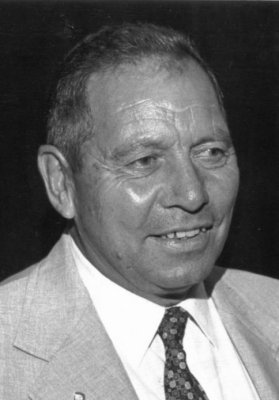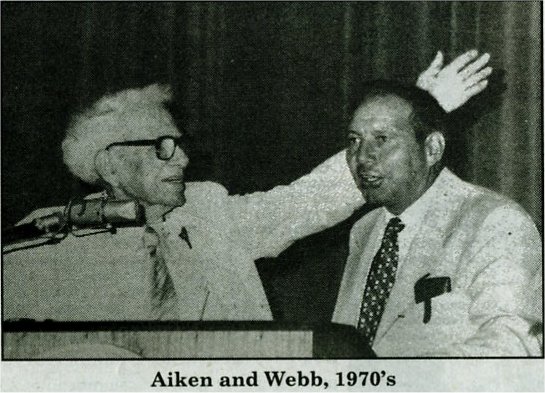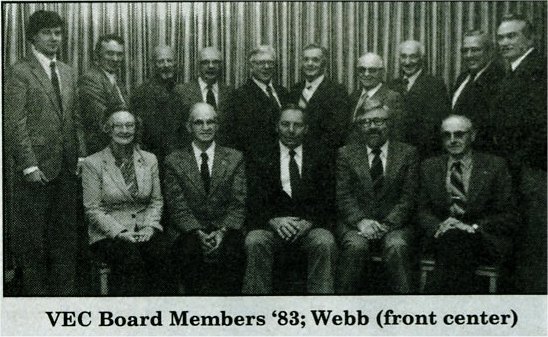|
Henry
|
 |
« : August 21, 2008, 08:45:02 AM » |
|
The following article was in the Co-op Life Bulletin sent to all Vermont Electric Customers recently and was written by Phyllis Stanley - What a wonderful tribute to one of our Fairfax Natives and what he did to insure we rural Vermonters had electricity.  J. Douglas Webb J. Douglas Webb
J. Douglas Webb was a strong, positive organizer who loved to "help people help themselves," beginning with Vermont farmers. He took on leadership roles in agricultural organizations with names like the Milton Co-op Dairy, Milk Promotion Services, United Dairy Industry Association, and Franklin County Maple Sugar Producers Co-op. He was invaluable as a Fairfax Town Selectman and still found time to be a Freemason and a Grange member. His service was recognized by the 2005 Lifetime Achievement Award from the Vermont League of Cities and Towns and by induction into the Vermont Agricultural Hall of Fame in 2007 for "Vermonters who have made a significant contribution to farming and agriculture."
Doug's son James says this busy man was never home. Bill, Doug's brother and partner, was also active in the community. James and his brother Dale are now the patriarchs, efficiently continuing to manage farm business on the shoulders of their father's and uncle's efforts. Their sister, Linda Willmott, has followed in Doug's community minded footsteps and is currently on the Mt. Mansfield Union School Board.
Continuity of Service at VEC
In 1946, Doug and Bill got electricity to the Farm with the help of the fledgling Vermont Electric Coop and the Rural Electrification Administration (REA). At that time, less than 10% of rural Vermont had access to electricity. Farmers wanted it badly to ease their workload in barns and milking parlors. Service from VEC was still unreliable and voltage was low at tail ends of lines. Within seven years, Doug Webb was elected to the VEC Board of Directors to represent District 6 and to see if he could help do something about continuity of service.
The Board members were almost all dairy farmers of like mind. The service had to be improved. In 1948 they hired Walter Cook to manage the Co-op's infrastructure. Cook was a civil engineer who had run power and communication lines in wartime Boston harbors for the Army before he came to Vermont and planted roots. He and Doug Webb hit it off immediately when they met in 1952.
Together, Cook, Webb and a dedicated Board not only improved continuity of service by clearing trees and rebuilding lines, but, by 1980, they had expanded rural service to 30,000 Vermonters.
All the Directors were encouraged to attend annual meetings of the National Rural Electric Cooperative Association (NRKCA) and to bring their wives along. All the Directors also understood the importance of their own wives. If the power failed while they were out working, it was their wives who answered the complaints of members in their districts. To the dismay
of some members, travel expenses to St. Louis, San Francisco, Anaheim, etc., were paid by VEC. Webb believed that "any money spent in the learning process is money well spent" to improve the effectiveness of VEC management.
During President Webb's tenure, 1973 to 1984, five women were active Board members — unusual at that time. For 12 years Laura L. D. Howe commuted to meetings from Jamaica in southern Vermont to serve as Director and Clerk of the Board.
"A strong, efficiently operated entity" was Doug Webb's description of VEC at the 1977 Annual Meeting. And in fact, at the next NRECA Annual Meeting, the Co-op was recognized for the way it conducted herbicide spraying and for its 1976 Annual Report, the best among 300 entries.
VEC had come of age, from its infancy in the arms of the REA, through its rapid growth, to an energetic player in the electric power industry.
The All Electric Dream Home
In 1973 when Doug Webb was elected President of the Board, the all-electric house was the modern dream. Walter Cook answered worried environmentalists with his king-range vision of new suburban homes with labor-saving devices — and heat — running on electricity, the cleaner energy. "Can we control the pollution of the environment at the electric generating plant more readily than at the individual home or business?" His answer then was "yes."
In 1975, Webb said of the trustees, "Our policy throughout the years has been to replace, repair, and build lines while low-interest money was in plentiful supply. The wisdom of that policy is proven by inflation and tripling of interest rates. The future holds additional challenges: to become less dependent on expensive, outside suppliers of power by owning or generating more of our own, and to hold rates in line." VFC was becoming more than lines and poles.
At the NRHCA meeting in 1976, the major speakers agreed that an energy crisis existed in the US but that "we are going to overcome it." One speaker, scientist Mike McCormack of Washington, was sure that nuclear energy would be the main source of energy developed for the next 20 or 30 years.
Hydro power also had its proponents and VEC was keen to develop the Hartland Dam on the Connecticut River. Webb foresaw the price rises ahead and the threat of another energy crisis like the one in 1973. Though VEC rates were still competitive in 1983, the Co-op would face a substantial rate increase when the North Hartland hydro station came on line. But, he said, "We are building North Hartland as part of a long-range power plan which will give us the lowest possible rates over the next 50 years."
Electric Co-ops Succeed
As VEC membership grew, participation shrank. In September 1984, at the end of the Webb/Cook regime, only 22% of members voted by ballot and 1.5% attended the meeting. Like a pastor on Easter Sunday, Webb said to
138 members, "It's great to see you all here at the 45th Annual Meeting, but this is what voting by mail does to Annual Meeting." Webb missed the large, interactive annual meetings where members asked their questions, voiced their opinions, voted by voice or show of hands, and generally kept their managers and representatives on their toes.
"A cooperative means cooperation, dedication, participation," Webb said at the 1977 Annual Meeting. He urged members to keep in touch with their directors. "No way do they know all of the problems you might have unless you tell them. Through understanding we can try to resolve them."
Schooled and sensitized by the national meetings of NRECA, Webb was a firm believer in the power of the cooperative. "Rural electrification... serves 25 million Americans," he said in 1984, "and they do it through cooperatives like yours and mine. They built good systems. They give good, dependable service. ... I'm proud of Vermont Electric Cooperative and what it has accomplished."
Changing Hands
In 1983, Webb quipped, "I'm not very old, but I can remember taking lanterns to the barn to milk the cows." This hard-working, progressive-thinking man showed signs of fatigue as he continued. "We're living in a different era and we must turn to modern technology. ... I look back 40 years ago — [the Co-op] was almost a social organization. It's not that way any more. There are millions and millions invested ... [to] have a reasonable source of energy as cheap as possible and still run a good organization.... We have a great divergence of opinion on your board right now. And that's good. I hope it stays that way."
Did he realty mean that? After years of cooperative effort among the Board members, factions developed primarily over the financing of nuclear power. In 1979, after 30 years of hard work, Walter Cook stepped down and an energetic young accountant named Bill Gallagher stepped up. In 1984, Webb and his supporters on the Board were deposed by new-comer Bob Northrop and his followers.
"45 years of stewardship" was the theme of the 1983 annual report. "For it is as stewards of this institution that we have had to make the tough decisions which benefit us all long-range," Webb said. "Many times ... we could have made short-term decisions which would have been popular and, for a short while, kept our rates lower. ... Instead we followed the course that took courage, imagination, and prudence. That, in my opinion, is the heart of stewardship."
In 1984, J. Douglas Webb received the Distinguished Service Award from the Northeast Public Power Association (NPPA) for having served on a consumer-owned utility board more than 30 years and having made significant contributions to public power.
We asked Walter Cook, now 94 and living on the edge of Lake Elmore, why he was smiling in most of his pictures in the Co-op Life archives. "I was happy," he said. "I had a wonderful job, I had a wonderful boss, I had wonderful Directors." Looking out his window in a moment of reflection, he said, "Doug was a hell of a fine, fine, fine guy." |









